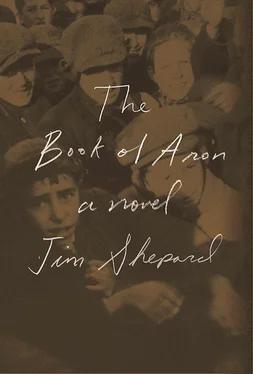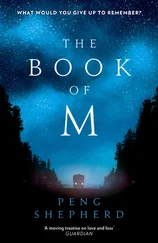Korczak spent two days a week arranging for help for other orphanages and the rest of the time he went begging for us. On those days he left early and returned late and always took a different boy. He begged at the Jewish Community Office and the homes of the rich or the collaborators and outside the cafés. The heavy woman worried about him. She said when he was gone that he came back in the evenings worn out from having had to raise hell over a barrel of sauerkraut.
Zygmuś said the kids he picked to go along were the ones who’d been with him since they were small, that he liked the kids he’d raised more than the rest.
I watched him late at night when he got back. With only one light on, he looked ancient. His hands shook and he rationed his cigarettes and vodka with saccharine and every few minutes he cleared his throat.
“So you’re up again,” he said one night when he finally saw me watching. “Aren’t you tired? Don’t we give you enough to do?”
I was always tired, I told him. And whatever I had to do I couldn’t handle.
“So you’re not one of my fire-eaters?” he asked. “Like your friend Zygmuś? Whose mother rode stags through the forest and ate horses?”
My mother took in washing, I told him.
“I remember you from the gang at the gate,” he said. And when I apologized he told me it was all right. I hadn’t been the cruel one and everyone had to do what they needed to in order to get by. All doors opened before the hungry.
He shook me awake on my cot the next day and told me to get dressed because I was coming with him.
When we got outside it was still dark. I didn’t want to be back out on the streets, I told him. He said he understood.
He talked nonstop as he walked. He said maybe today we’d visit the Germans. He said the officer assigned to supervise the orphanage had been a pediatrician himself and always referred to Korczak as his “respected colleague” and thought that was hilarious. He said the officer called the orphanage his “republic of swindlers” and said the Jews managed to adjust to every situation but never knew how good they had it, like the man who complained he had no golden shoes but didn’t realize that he was soon to lose his legs.
It was windy and muddy and cold and everyone who was out early moved around as if fed up with his own exhaustion. Most were beggars who’d been out all night. We stopped next to a girl with bare arms squatting in front of a little wagon carrying frozen and rotted rutabagas. A younger girl was curled up under the wagon with her feet covered in newspaper wrapped and tied into the shape of shoes. Korczak knelt next to her and put something in her hand. Both girls did everything slowly.
“Enough about the Germans,” he said, once we started walking again. He blew on his hands. He talked about how some of the orphanage girls had surprised him with a movie they made with a waxed paper box and electric bulb.
I asked where we were going and he asked if it mattered. He said that given one circumstance or another we were all tied up like dogs on a chain.
After I didn’t answer he apologized for saying something so unhelpful.
His apology made him quiet. In the darkness we passed Przejazd Street and the Immortal Hole and the building with the slanted roof and the dormers.
He said that in one house the previous week he found six children on a wet and rotting mattress. And when I still didn’t say anything he asked who wasn’t sad? He said the world was one great sadness. He said what we needed to do was tell ourselves that we weren’t living in the worst place in the world but instead were surrounded by grasshoppers and glowworms.
From his expression it didn’t look like he was being ironic. I told him again that I didn’t want to be out on the street and when he didn’t answer I said I didn’t want to be at the orphanage either. He said I was free to leave and I hated him for making me feel the way I did and hated myself even more for not just being dead somewhere.
The sun came up and he asked if I was at least happy to be out in the sunshine. I rubbed my arms and face and he asked if I’d heard him. I told him that whether I was happy or unhappy, I took things as I found them. He said his mother used to say when it was sunny and he was particularly gloomy that not even a Jew could suffer on a day like today.
Every few steps now someone was begging or selling or had come out of a hole and was trying to keep warm. One was wrapped in a quilt that was losing feathers in the wind. Someone was selling milk out of their house and we got in line for some. “Wherever there’s a line I stand in it, no matter what they’re selling, because I know I’m going to get something,” he joked.
We began our begging at a rich man’s house. He rang the bell. The man when he answered the door said, “Oh, Pan Doctor, you’re killing me here,” instead of hello, and Korczak asked him what was worse than being an old man and then answered being an old Jew. And what was worse than that? An old Jew who was penniless. And worse than that? An old Jew who was penniless and unresourceful. And worse than that, an old Jew who was penniless and unresourceful and who bore the burden of a large family. And worse than that, someone whose large family were all children. And worse than that, children who were starving.
The man disappeared from the door and returned with some money and dumped it into a sack Korczak held out. Then he excused himself and said good morning and shut the door while Korczak looked into the sack.
He led me to the next house. He said he himself had been well-to-do until his father had to be put into a mental hospital. And that’s when he learned what it meant to have to turn to adults for help. Adulthood was a privileged position against which he’d had to struggle. He’d heard a lot about the proletariat as a teenager, but the world’s oldest proletariat was the child. The child was hounded even by those who loved him. He’d decided then and there that he’d become the father of orphans and would always work for those who should come first but always came last.
“Like you, I was always slow doing everything,” he said. “When my grandmother would watch me at a chore she’d always say, ‘You. Philosopher.’ ”
“When my father called for my help he always said, ‘Hey! Bungler!’ ” I told him.
“And you always helped him,” he said.
“I didn’t like to work,” I told him.
“The laziest person I ever knew was a man named Krylov who spent the entirety of his adult years on his couch, with all of his books beneath it,” he said. “He would just reach down and read whatever came to his hand.”
We walked to other houses and when the people who answered the door said no he wouldn’t go away. He just repeated, “But my children. My children.” I thought about my mother. “Stay still while I’m talking,” he told me between houses.
At lunchtime we stood inside the door of a café and he shouted, “Is there someone here who can get my children through the winter?” And a man called him over and he approached some others, thanking those who gave and saying about what went into the sack, “Not enough, not enough.” In the afternoon we stopped at the post office to go through the packages that were undeliverable after the German soldiers had opened them.
Walking back to the orphanage we passed Mrs. Melecówna’s parlor. The sidewalk was blocked by kids standing with their hands out and weeping. He gave something to each.
After we’d gone a few blocks I asked if he wanted to rest because he looked so tired. He said we’d gotten to the point where dead children no longer impressed us. He said that if a man couldn’t look on calmly at the death of another then his own life was worth a hundred times more. He was having enough trouble walking that he leaned on each house railing we passed. He said it was like how some people still went to visit relatives who’d been taken to the hospital.
Читать дальше












